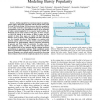Free Online Productivity Tools
i2Speak
i2Symbol
i2OCR
iTex2Img
iWeb2Print
iWeb2Shot
i2Type
iPdf2Split
iPdf2Merge
i2Bopomofo
i2Arabic
i2Style
i2Image
i2PDF
iLatex2Rtf
Sci2ools
110
click to vote
SOCIALCOM
2010
2010
Traffic in Social Media II: Modeling Bursty Popularity
Online popularity has enormous impact on opinions, culture, policy, and profits, especially with the advent of the social Web and Web advertising. Yet the processes that drive popularity in our online world have only begun to be explored. We provide a quantitative, large scale, longitudinal analysis of the dynamics of online content popularity in two massive model systems, the Wikipedia and an entire country's Web space. In these systems, we track the change in the number of links to pages, and the number of times these pages are visited. We find that these changes occur in bursts, whose magnitude and time separation are very broadly distributed. This finding is in contrast with previous reports about news-driven content, and has profound implications for understanding collective attention phenomena in general, and Web trends in particular. To make sense of these empirical results, we offer a simple model that mimics the exogenous shifts of user attention and the ensuing non-linea...
| Added | 15 Feb 2011 |
| Updated | 15 Feb 2011 |
| Type | Journal |
| Year | 2010 |
| Where | SOCIALCOM |
| Authors | Jacob Ratkiewicz, Filippo Menczer, Santo Fortunato, Alessandro Flammini, Alessandro Vespignani |
Comments (0)

